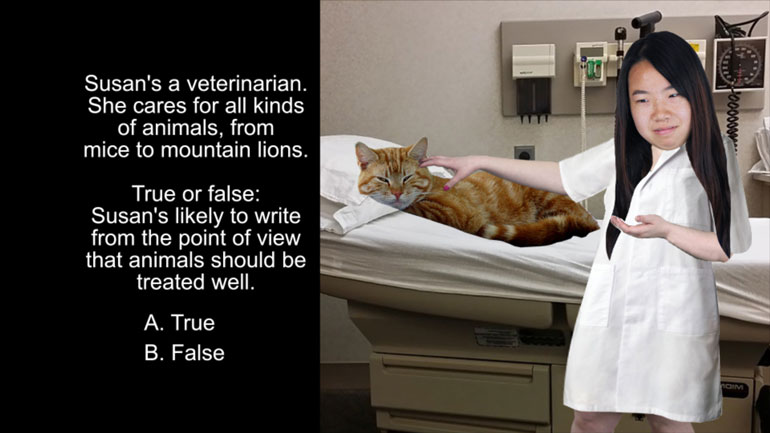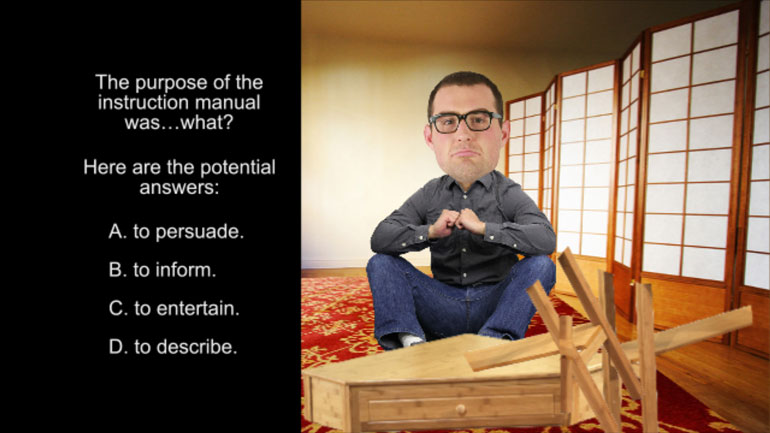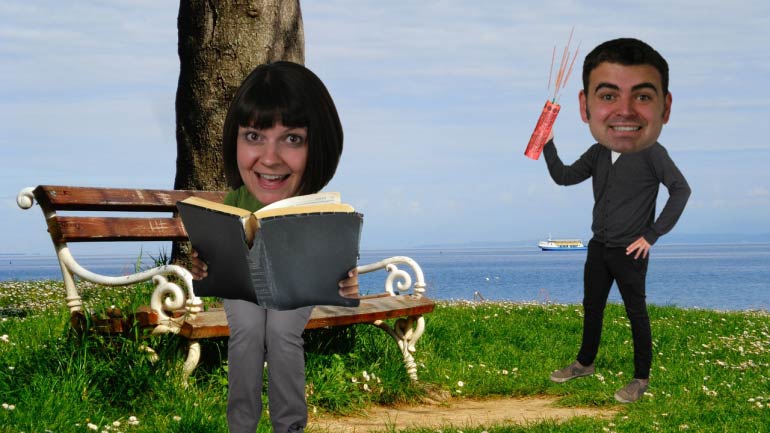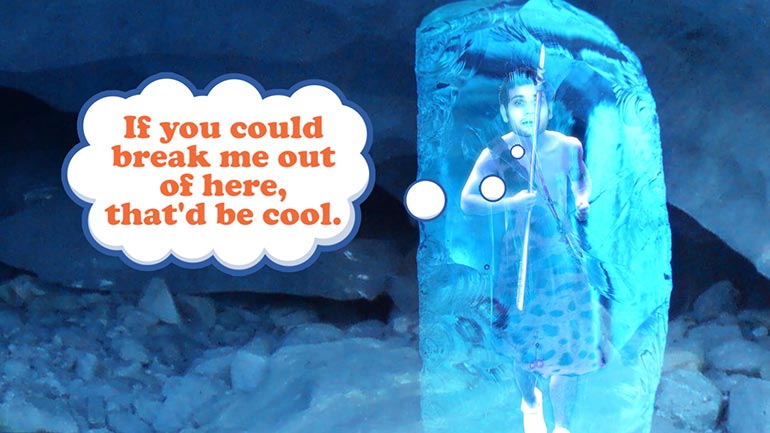ShmoopTube
Where Monty Python meets your 10th grade teacher.
Search Thousands of Shmoop Videos
Science 3: How to Research 24 Views
Share It!
Description:
Today we'll teach you how to sort between the right and wrong sources for your research. Remember, .edu sites are probably good, sites with tons of pictures of dancing octopi in the background...probably not. Unless you're looking for information on dancing octopi.
Transcript
- 00:04
[Dino and Coop singing]
- 00:13
You know what one of our favorite feelings is?
- 00:16
That happy glow we get when we turn in a paper to our teacher! [Student starts to glow as he puts the paper on the teacher's desk]
- 00:19
After all, behind every paper is hours and hours of hard work, researching, revising, [Student asleep at different desks]
- 00:24
and editing…
Full Transcript
- 00:25
All culminating in that one glorious, beautiful moment [Student printing his paper]
- 00:29
where we can finally say we're officially done!
- 00:31
NO MORE PAPERS!
- 00:33
Take that schooo... [Student dancing with confetti in the background]
- 00:35
Oh.
- 00:35
Great.
- 00:36
Another paper.
- 00:37
Such is life, huh? [Student sheds a tear as he starts to write another paper]
- 00:38
Starting a paper sure can be scary, especially because the first step in writing one – that
- 00:43
whole pesky “research” thing – can be pretty difficult. [A mountain of books]
- 00:46
But if you know how to research smartly, you'll save yourself oodles and oodles of time.
- 00:51
So let's get crackin'! [Egg cracks]
- 00:52
When you're starting your research, you'll probably begin with the internet. [Students laptop appears]
- 00:55
After all, it's fast, easy to use, and always right at your fingertips.
- 00:59
And we're all for it – hey, we love the internet. [Girl has love hearts in her eyes while she uses her laptop]
- 01:02
Where else would we find all our favorite cat videos…?
- 01:05
But when it comes to research, you need to know the right places to look.
- 01:09
Good places to look include...
- 01:11
Databases, library websites, historical archives, government websites, academic and school websites [Pictures of the places to look]
- 01:17
that end in “dot e-d-u,” and anything else that's more or less “official.”
- 01:22
There are also plenty of ways to find old newspapers and sections of non-fiction books [Websites of old newspapers and non-fiction library books]
- 01:27
online, and those tend to be pretty safe, too.
- 01:29
Bad places to look include... well, anything that isn't what we've just said. [List of bad places]
- 01:33
It's really hard to say exactly what isn't a good source.
- 01:36
But if the website looks at all fishy, ask a nearby adult to check it out for you. [Suspicious looking website saying dinosaurs discovered the moon]
- 01:40
After all, anyone can put information out there onto the internet, which means you can [Guy wearing a cap sideways using a laptop and laughing]
- 01:44
find some pretty whacky stuff if you look hard enough.
- 01:46
Of course, you don't have to use the internet. [Hand flicks away a computer]
- 01:49
And in fact, it's often easier to just head straight to the library's non-fiction section,
- 01:53
because almost everything there will be a-okay to use in your paper! [Student with thumbs up in the non-fiction section]
- 01:57
Another nice thing about books is that they have all these super-useful text features
- 02:01
to help you locate exactly what it is you're looking for, including...
- 02:04
…a table of contents at the beginning…
- 02:06
…subtitles and topic sentences for each paragraph, which you can read to get an idea [An example of the text features is shown]
- 02:10
about what information is in that paragraph, and if it's worth reading or not…
- 02:14
…and even illustrations, captions and charts to help to better explain anything that might
- 02:18
otherwise be a little bit confusing.
- 02:20
And whether you're using the internet, books, or any other kind of source, it's super important [Pictures of the sources]
- 02:24
to take proper notes.
- 02:25
That means jotting down the important information as you find it, and taking specific note of
- 02:29
each page number or website URL so you can come back to it later if you need to.
- 02:34
The trick here is to only take note of the important stuff, otherwise your notes may [Post-it note saying only to write down the important stuff]
- 02:38
end up longer than your paper, and what good is that?
- 02:42
Once you've collected enough information on the topic, it's time to write your first draft. [Notebook next to blank page]
- 02:46
It can be useful to write an outline first, which includes your main idea, and the point [Coop pointing at a blackboard]
- 02:50
you want to make in each paragraph.
- 02:52
Once you've done that, it's time to start writing!
- 02:55
Start first with your introductory paragraph. [The paragraph is highlighted]
- 02:57
You'll use this paragraph to get the reader hooked before launching straight into your [Penguins gathered round a paper]
- 03:01
body paragraphs that dive deep into all that juicy information you dug up. [Student with a treasure chest that has information inside]
- 03:06
And remember: each paragraph should have a solid topic sentence that outlines exactly
- 03:10
what each paragraph is about. [Example topic sentences]
- 03:12
This will help the reader keep track of your ideas – and keep you on track when you're
- 03:16
writing, too.
- 03:17
Close it out with a nice concluding paragraph, and there's your first draft, done and done. [Tick appears]
- 03:22
And since this is the first draft, don't be afraid to really get wild.
- 03:26
Feel free to include every zany and outrageous idea you might have, because you can always
- 03:30
edit out anything that doesn't quite fit later. [Sentence is crossed out in red]
- 03:32
Oh, and one more thing:
- 03:34
When you're including specific ideas from all that research you did in your own paper,
- 03:38
you need to make sure to cite the information correctly.
- 03:41
You can get in big trouble for pretending that someone else's ideas are your own, so [Teacher looking angry at the student]
- 03:45
it's important to get this part right.
- 03:48
And when it comes to citing another author's words, you've got two options: [Finger pointing to writing in a book]
- 03:52
The first is to paraphrase.
- 03:53
This is when you use your own words to summarize what someone else said.
- 03:56
The other option is to quote them.
- 03:58
This is when you put quotation marks around the exact words that they said, so that we
- 04:03
know which words are yours and which words are theirs.
- 04:05
Oh, and also make sure to mention their name as well.
- 04:09
You wouldn't like it if someone told one of your jokes, but didn't give you credit, right? [Boy who's joke was stolen looks annoyed]
- 04:12
Same idea applies here.
- 04:14
And that's it!
- 04:15
Phew!
- 04:16
We sure just covered a whole lot of research material in one video, huh? [Boy looking confused with swirls over his eyes]
- 04:19
Good thing we've got plenty more resources on Shmoop that go into specific detail about
- 04:24
all the different topics we just covered.
- 04:26
So, uh…why not exercise some of those great research skills of yours and find them? [Kid doesn't look enthusiastic]
Up Next
ELA Drills, Beginner: Point of View. Is the statement in the video true or false?
Related Videos
ELA Drills, Beginner: Textual Analysis 1. The purpose of the instruction manual was...what?
ELA Drills, Beginner: Point of View 3. Which sentence in the passage best shows the narrator's point of view on the topic of Chelsea Simpson?
We wanted to make a video about sedentary rocks, but we couldn't get lazy uncle Rocky off the couch. Oh well. We'll teach you about sedimentary roc...
Today we're bringing you the opposite of Jurassic Park—how living things become fossils. Okay okay, it might not be quite as fun...but hey, at le...




